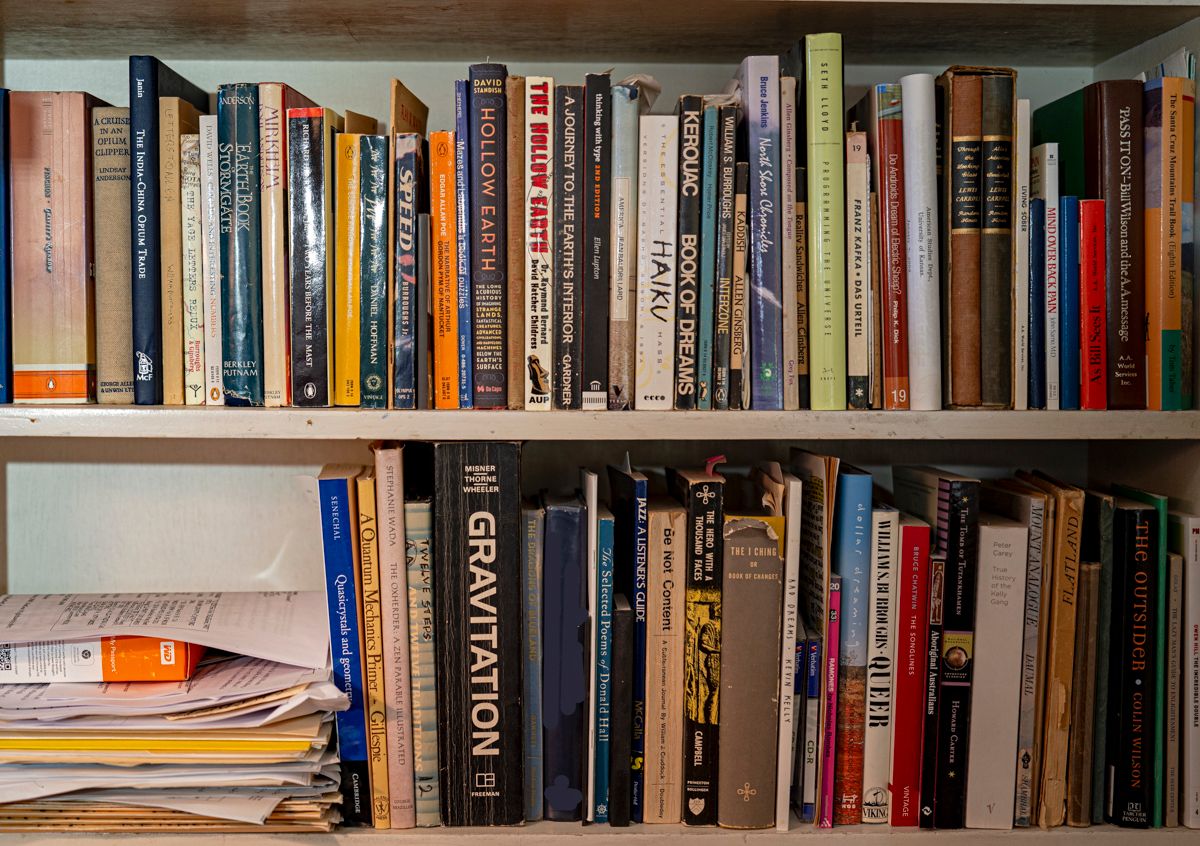
Rudy Rucker’s Shelfie
Eight of the books on the shelves by my desk. We’ll go left to right, top to bottom.
Thomas Pynchon, Gravity’s Rainbow. One of the most important books I’ve read. I read it when it was new, in 1973, and I’ve read it many, many times since then. Pynchon is one of my greatest influences. I love how colloquial and funny and smart the novel is.
William Burroughs, Letters to Allen Ginsberg 1953-1957. A little hard to see this one, it’s the fourth from the top left… I had to write the title on the spine. This book is a supreme masterpiece, and the true core of everything I know about how to write.
Marshall B. Gardner, A Journey to the Earth’s Interior. I’ve always loved the notion that the Earth might be hollow, looking something like a tennis ball in cross-section, with a vast inner space filled with air and light. And although, oddly, this is not well known, there would be no gravity on the inside. The attractive forces of the outer shell of matter would cancel out. I published two novels set there, The Hollow Earth and Return to the Hollow Earth, both of them featuring Edgar Allen Poe as a character.
Lewis Carroll, Through the Looking Glass and Alice in Wonderland. Carroll is my mystic double, an academic mathematician who wrote playful, amusing, fantastical romps. I’ve had this two-book set since my earliest years.
Charles Misner, Kip Thorne, and John Wheeler, Gravitation. I got hold of this book in 1971 when I was a graduate student, and just starting to think about ways to connect the fourth dimension with time, and with the special effects of science fiction. As I liked to say, the book is heavy in every sense of the word.
William J. Craddock, Be Not Content. This is rich, transreal novel about the earliest of the acidheads. The tale is insanely deep and funny. I first read it in the mid-1970s, lost my copy, and, strange as it sounds, I reissued the book under my own Transreal Books imprint from 2012 - 2020. I happened to be living in Craddock’s home town, San Jose, California. He was dead, but I got in touch with his widow. I knew nothing about self-publishing, but I learned how.
Joseph Campbell, The Hero With a Thousand Face. The ultimate road guide for writing a novel. For my epic galactic tale White Light, I literally lined up Campbell’s stages of the monomyth, and wrote a chapter for each one. It was fun. And I find that even when I am not consciously using the stages, I often am.
Edwin Abbott, Flatland. The one and only, the fountainhead of my career. I first read it in high-school, and again in college, and I loved to think about it. In grad school I had the idea of writing a fuller biography of the Flatland hero, A Square, including my hand-drawn illustrations. And thus arose my two non-fiction books on the fourth dimension, my novel Spaceland, and numerous 4D scenes in my other tales. Flatland is where it’s at!
Copyright © Rudy Rucker 2025.
Rudy Rucker has published about forty books, including popular science SF novels in the cyberpunk style, and SF in the transreal style—these incorporate elements of his real life. He received Philip K. Dick awards for his Software and Wetware. Rucker’s most recent novel Juicy Ghosts is about telepathy, immortality, and an evil President. Highly topical!
His nonfiction books include The Fourth Dimension, and Infinity and the Mind, as well as a work on the philosophy of computation.
Rucker earned a Ph.D. in math from Rutgers University in 1970. He worked for twenty years as a professor of computer science at SJSU in Silicon Valley. For a time he was a software engineer at Autodesk. He published a book on software engineering, and co-authored commercial software packages on chaos, cellular automata, and artificial life.
Rucker has been painting for 25 years. He paints works loosely related to his novels and to his life.
Rucker has also been known to blog. His microblog handle is @rudytheelder on X/Twitter, Bluesky, and Mastodon. For more info.
Shelfies is edited by Lavie Tidhar and Jared Shurin.
Join us on instagram at @shelfiesplease.